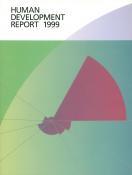Human Development Report 1999
Human Development Report 1999
July 9, 1999
Global markets, global technology, global ideas and global solidarity can enrich the lives of people everywhere. The challenge is to ensure that the benefits are shared equitably and that this increasing interdependence works for people—not just for profits.
This year’s Report argues that globalization is not new, but that the present era of globalization, driven by competitive global markets, is outpacing the governance of markets and the repercussions on people. Characterized by “shrinking space, shrinking time and disappearing borders”, globalization has swung open the door to opportunities.
Breakthroughs in communications technologies and biotechnology, if directed for the needs of people, can bring advances for all of humankind. But markets can go too far and squeeze the non-market activities so vital for human development. Fiscal squeezes are constraining the provision of social services. A time squeeze is reducing the supply and quality of caring labour. And an incentive squeeze is harming the environment. Globalization is also increasing human insecurity as the spread of global crime, disease and financial volatility outpaces actions to tackle them.
Highlights
- People everywhere are becoming connected — affected by events in far corners of the world;
- The 1990s have shown increasing concentration of income, resources and wealth among people, corporations and countries;
- Poor people and poor countries risk being pushed to the margin in this proprietary regime controlling the world’s knowledge;
- With stronger governance, the benefits of competitive markets can be preserved with clear rules and boundaries, and stronger action can be taken to meet the needs of human development;
- Narrowing the gaps between rich and poor and the extremes between countries should become explicit global goals;
- An essential aspect of global governance is responsibility to people — to equity, to justice, to enlarging the choices of all.

 Locations
Locations